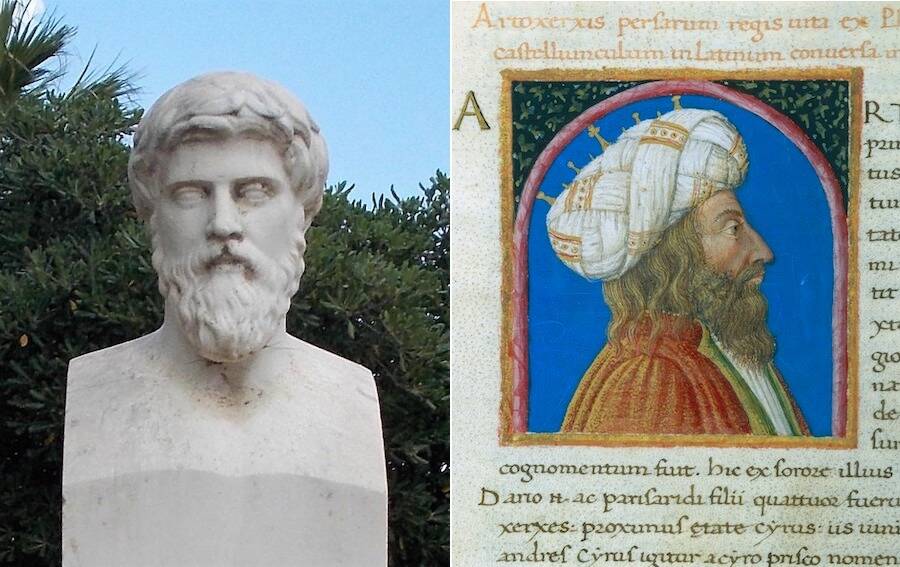The Horrifying History Of Scaphism, The Excruciating Execution Method Of Ancient Persia

The Horrifying History Of Scaphism, The Excruciating Execution Method Of Ancient Persia
Based in the Greek word “skáphē” which translates to “bowl” or “grave,” scaphism remains one of the most macabre execution methods ever devised by humankind.
Humans have dreamed up a variety of gruesome and inspired ways to kill each other for millennia. From medieval execution methods to the botched executions of today, each historical period used the tools at hand to cruelly extinguish those it deemed unworthy.
The Persian Empire arguably trumped them all, however, when it created scaphism around 500 B.C.E. This ancient execution method was also known as “the boats,” as victims were placed in two hollowed-out logs or boats before their suffering even began.
With their heads and limbs sticking out and their bodies trapped inside, the victim was force-fed milk and honey. Their uncontrollable diarrhea filled the boats as executioners poured honey over the victim’s face — and vermin arrived to not only feast upon the prisoners, but enter their bodies to fatally eat them from the inside out.
Trending Today In Rwanda
The History Of Scaphism
It’s important to note that no tangible proof of scaphism exists. But also, after more than two millennia, any human remains or evidence of the torture would have been long destroyed. As it stands, the first historical mention of scaphism was in the works of Greek-Roman philosopher Plutarch.

Left: Wikimedia Commons; Right: DeAgostini/Getty ImagesThe first historical mention of scaphism was found in Plutarch’s (left) Life of Artaxerxes (right).
Plutarch himself had seen such an execution after a soldier named Mithridates killed Cyrus the Younger, the brother of King Artaxerxes II. While Mithridates had stopped Cyrus from overthrowing the king and Artaxerxes was grateful, Artaxerxes demanded he keep this a secret — and tell others it was he who had slain Cyrus.
Mithridates would forget about that covenant and drunkenly boast about killing Cyrus himself at a banquet. When King Artaxerxes II heard of this, he sentenced him to die by scaphism for his treachery and demanded he perish slowly. Ultimately, Mithridates endured 17 days of scaphism before he died.
Plutarch wrote that the king “decreed that Mithridates should be put to death in boats; which execution is after the following manner: Taking two boats framed exactly to fit and answer each other, they lie down in one of them the malefactor that suffers, upon his back.”
“Then, covering it with the other, and so setting them together that the head, hands, and feet of him are left outside, and the rest of his body lies shut up within, they offer him food, and if he refuse to eat, they force him to do it by pricking his eyes; then, after he has eaten, they drench him with a mixture of milk and honey.”

Left: Hulton Archive/Getty Images; Right: Emory UniversityKing Artaxerxes II (left) and impending victims of scaphism (right).
Plutarch detailed how this mixture was also poured on the victim’s face which blistered in the sun as the days-long torture continued. Initially, only flies would be drawn to the victim. As the prisoner defecated in the enclosed boats and vomited, however, vermin emerged to crawl inside their orifices.
“When the man is manifestly dead, the uppermost boat being taken off, they find his flesh devoured, and swarms of such noisome creatures preying upon and, as it were, growing to his inwards,” wrote Plutarch. “In this way Mithridates, after suffering for seventeen days, at last expired.”
Death By ‘The Boats’
Joannes Zonaras further detailed the horrors of scaphism in the 12th century. While Zonaras merely based these observations on Plutarch’s own, the Byzantine chronicler opined that ancient Persians “outvie all other barbarians in the horrid cruelty of their punishments” that came after.
Tags
Comment / Reply From
You May Also Like
Popular Posts
Newsletter
Subscribe to our mailing list to get the new updates!
Categories
- Places and Regions (349)
- Health & Science (3559)
- Jobs (188)
- Work Life (286)
- Opinions (426)
- Real estate & Properties (121)
- Shipping & Logistics (64)
- Sex & Relationships (1755)
- Movies & Animation (6102)
- Comedy (229)
- Travel and Events (427)
- Gaming (1185)
- History and Facts (1296)
- People and Nations (1020)
- Science and Technology (3704)
- Arts & Entertainment (1810)
- Life Style (3627)
- Education (3386)
- Economics and Trade (1950)
- Others (5396)
- News and Politics (3218)
- Cars and Vehicles (430)
- Pets and Animals (326)
- Digital Marketing & Web Develpment (4)
- Robotics, VR & AR (0)
- DFTUntoldStories (1)
- Celebrities (83)
- Mobile Solutions & Apps (0)
- Ecommerce & Clean Tech (0)
- Artificial Inteligence & IoT (0)
- Big Data & Cyber Security (0)
- Business (1780)
- Palscity Show (0)
- Sports Show (0)
- Politics & Leadership Show (0)
- Digitally Fit Show (0)
- Entertainment & Lifestyle Show (0)
- Business Show (1)
- In The Morning Show (0)
- DFT Reels & Shorts (0)
- Natural & Food (1141)
- People and Culture (11)
- Sports (1906)
- Fashion (116)
- Gossip (55)
- Music (116)


